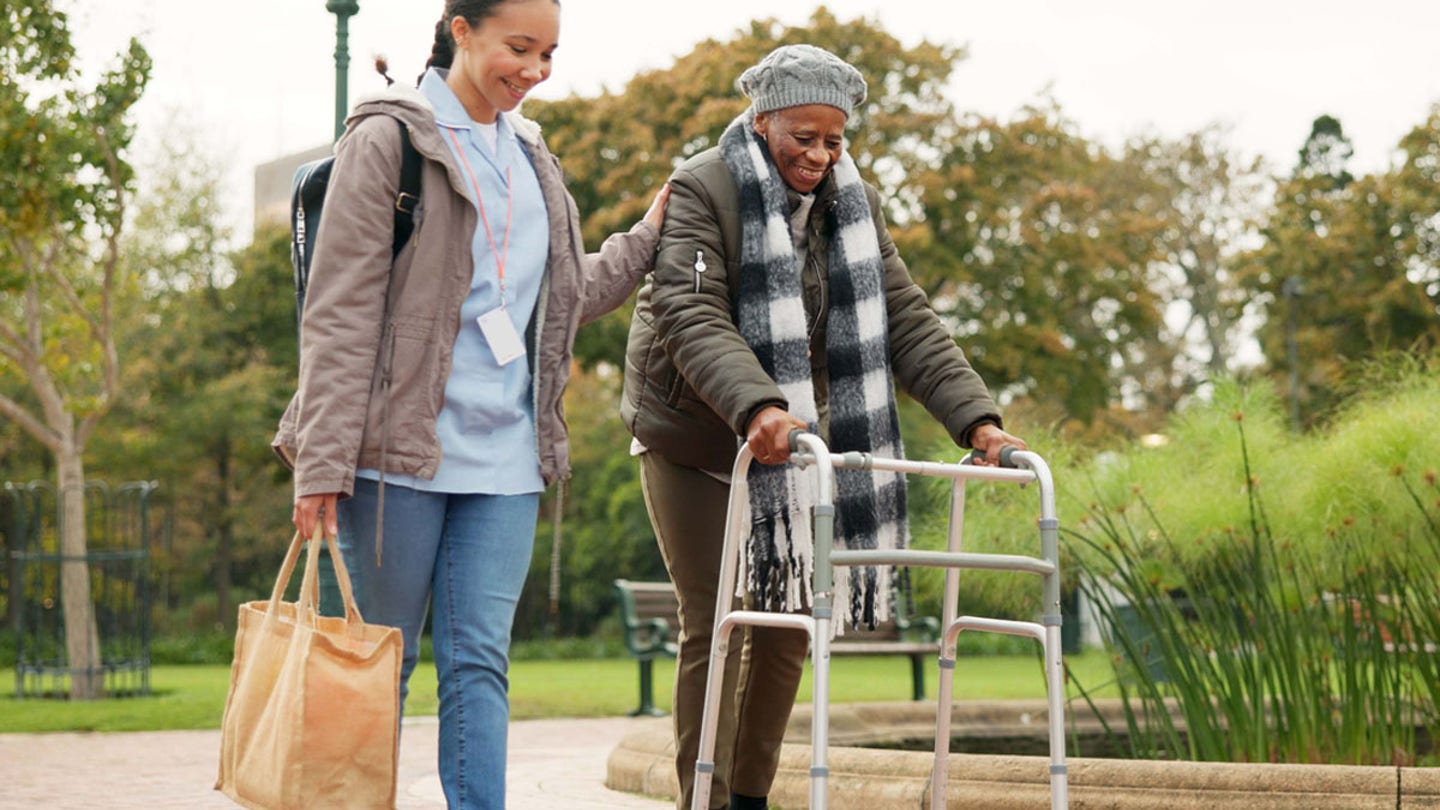A slower walking pace could be a sign of cognitive decline or dementia, a new study suggests.
Researchers assessed more than 16,800 healthy people over the age of 65 in the U.S. and Australia during a seven-year period (2010 to 2017), according to the published study in JAMA Network Open.
The investigators measured participants’ walking speed and performed cognitive tests every two years.
ALZHEIMER’S PATIENT, 90, SAYS SKIING AND OTHER ACTIVITIES KEEP HIM MENTALLY SHARP
Those who demonstrated a decrease in walking speed by at least 2 inches per second a year — along with slower cognitive ability — had a higher risk of dementia, as compared to individuals considered to be “non-decliners, cognitive-only decliners or gait-only decliners,” according to the report.
A slower walking pace could be a sign of cognitive decline or dementia, a new study suggests. (iStock)
“The combination of declining memory and slowing gait seems to be a stronger indicator of future dementia risk than decline in one of those things alone,” Dr. Taya A. Collyer, PhD, who led the study out of Monash University in Australia, told Fox News Digital.
Family members often comment that their loved one had changed prior to a dementia diagnosis, according to Dr. Amy Brodtmann, a neurologist and professor of the Cognitive Health Initiative at Monash University in Australia.
SLEEPY DURING THE DAY? IT COULD BE AN EARLY WARNING SIGN OF DEMENTIA, STUDY SUGGESTS
“There has long been an assumption that a slowdown – of walking, thinking and actions – is a sign not just of aging, but of developing cognitive impairment and dementia,” she told Fox News Digital.
‘Simple to measure’
The researchers suggested that measurement of walking speeds could be a useful tool – combined with other screening measures – to help identify individuals who are at risk of developing dementia and ensure that they receive early testing and preventive interventions.
“We don’t yet have a definitive test for dementia that family doctors can do in their own clinics,” noted Brodtmann, one of the co-authors of the study.

People who have challenges with balance and mobility may consider using an assistive device to ensure safe and consistent walking. (iStock)
Walking speed is very “simple to measure,” Collyer added.
“Our study also suggests that family doctors might keep an eye on walking speed when they (or their patients) have concerns about dementia,” she said.
DEMENTIA RISK COULD BE HIGHER FOR OLDER ADULTS WHO EXPERIENCE THIS TYPE OF INJURY, STUDY FINDS
The manner in which a person walks, also known as the gait pattern, could help signal a potential issue, according to Edward Farrell, a physical therapist and certified strength specialist at Physical Solutions Physical Therapy and Fitness on Long Island, New York.
“Our gait pattern and speed requires reflexive planning, adjustments to surfaces, and focus and attention, which are often impaired with cognitive diseases,” Farrell, who was not involved with the study, told Fox News Digital.
Other risk factors
Courtney Kloske, PhD, director of scientific engagement for the Alzheimer’s Association in Chicago, Illinois, noted the importance of exploring other factors that may impact risk in diverse populations.
These risk factors include genetics, health conditions such as hypertension, health-related behaviors like physical activity and diet, and environmental elements, such as air pollution.
“Up to 45% of dementia cases could be delayed or prevented by adopting healthy lifestyle factors.”
“While not all factors are modifiable, research shows that up to 45% of dementia cases could be delayed or prevented by adopting healthy lifestyle factors,” Kloske, who was not involved in the study, told Fox News Digital, citing the 2024 Lancet Commission, a collaborative report from leading dementia experts.

The manner in which a person walks, also known as the gait pattern, could help signal a potential issue, according to experts. (iStock)
The study highlights the benefits of adopting healthy lifestyle behaviors early and consistently, including helping to prevent or postpone the onset of cognitive decline, according to Kloske.
She recommends adhering to a healthy diet, maintaining a regular exercise routine, controlling diabetes and blood pressure, and staying socially engaged.
Step into health
Working to improve one’s walking stride is also important for overall health, according to Farrell.
“The ability to maintain a more normal gait stimulates our systems, allowing greater mobility, more independence and reduced fall risk,” he told Fox News Digital.
CLICK HERE TO GET THE FOX NEWS APP
Farrell recommends taking frequent walks at various paces, with intervals of moderate to faster speeds, to improve reflexes. Certain exercises also support walking speed and pattern, he noted.
CLICK HERE TO SIGN UP FOR OUR HEALTH NEWSLETTER
“Regular strength training like squats, step-ups, bridges and leg lifts can keep our foundational muscles strong as we age,” he advised.
“Stretching to keep hamstrings, hip flexors and calf muscles limber allows for more free mobility to walk.”

“Regular strength training … can keep our foundational muscles strong as we age,” an expert advised. (iStock)
Performing balance exercises like heel-toe walking, single leg stance drills and Tai chi can also improve stability and confidence with walking, Farrell noted.
For those who plan to start a walking program, it’s best to wear supportive sneakers that provide a stable base and cushioned comfort, the expert added.
For more Health articles, visit www.foxnews.com/health
People who have challenges with balance and mobility may consider using an assistive device like a cane to ensure safe and consistent walking.
It is important to consult with a health care provider prior to starting a exercise regimen, experts agree.
